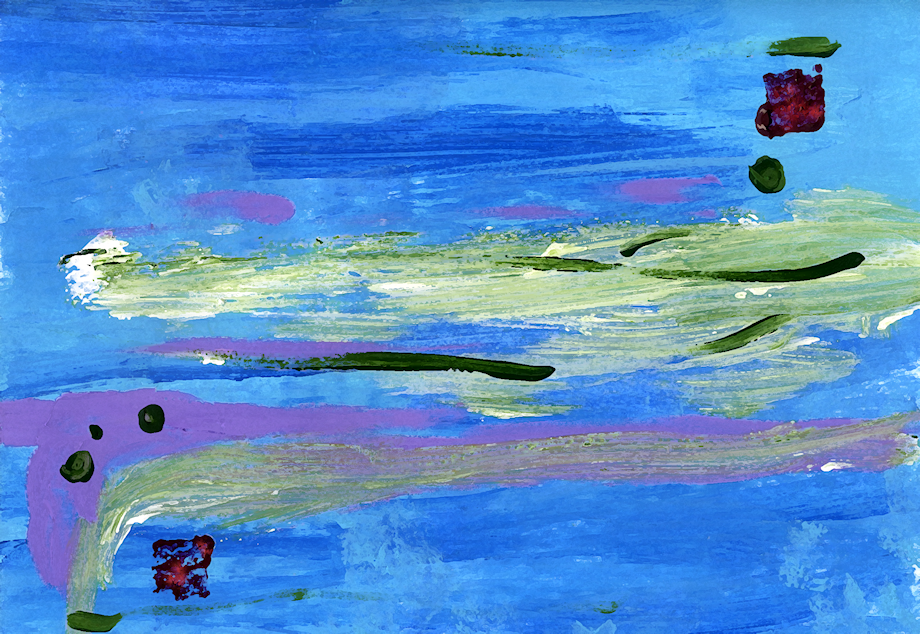
I call my mother to tell her I’m dying. I am laying on my back on the dirty off-white carpet of my apartment in Maryland, having another panic attack. Of course, I am not dying. I feel outside my body, as if I’m looking down on myself telling her my goodbyes. I want my sister to know I love her. I don’t mention my father. I can barely hear her voice over the adrenaline in my arms, which hums as if full of electricity. I tell her it feels like there is a race car in my veins. I don’t expect any of this to make sense.
I had gone to the emergency room two weeks earlier convinced I was dying that time, too. The doctors checked my heart rate, gave me an Ativan. On the wall across from me was a sign that said, Please do not eat or drink anything before checking with the nurse. They let me go at about five in the morning, at which point the taxi driver asked me if I’d had a long night. I wanted to laugh so bad. He played some terrible radio station too loud. The sun started to rise. I looked down at the prescription for Klonopin in my lap, fourteen pills. Take as needed. I needed a lot.
My mother eventually tells me to call a doctor, I jump to ambulance, so the paramedics enter my apartment where they find me on the floor. Do not stop taking it without checking first with your doctor.[i] Even barely being able to repeat my name I feel shame for calling them. I know I am dying and I know I am not. My body feels so full it can’t stand on its own, so I’m laid on a stretcher. My neighbors come out of their apartments, their faces lit with the blue and red glow.
Clonazepam is the generic for Klonopin, which is a benzodiazepine, a controlled substance. Your doctor may want you to gradually reduce the amount you are using before stopping it completely. [ii] I took a milligram at a time, every day or twice a day for a couple of weeks. No one told me it’s addictive. No one told me when you run out, you run out, and your body won’t go quietly.
This may help prevent worsening of your condition and reduce the possibility of withdrawal symptoms, such as…hallucinations…tremors, or unusual behavior.[iii]
The next morning, I watch the light from the vertical slatted blinds play on the ceiling. My parents tell me to come home. They sit me down in the living room and each sit in opposite chairs. They look worse than me, but I can’t see myself clearly. Above me are mounted deer and elk heads covered in dust. My father tells me I’m checking into a mental hospital program. This time, I don’t argue.
At the hospital intake session I lie about being suicidal so that they won’t hold me overnight. If they held me, I could lose my job and have to tell my boss about the panic. But oh, I wanted to be held, to be told what to do about the panic that came so fast it felt like riding a bike with no brakes down a hill. I knew I had to stop it, I just didn’t know how.
The first day of group therapy we sit in a circle. A woman in the group thinks my disheveled looks and my black hoodie in the middle of summer are chic. She calls me Hollywood. I don’t understand this. But then again, when the panic set in, I felt led by a role set by a maddened director, someone else calling the shots and telling me the scripted dialogue. I wasn’t myself, I was a version of myself under someone, or something’s control. I was here in the hospital waiting for someone to call cut.
Above us there is construction, which sounds like elephants playing soccer. I try to focus on filling out the worksheet. I can almost make out the sound of lumber being cut and put into place, a framing crew building a new wall or tearing down another. The quick and retracted sound of a nail gun. I know something new is happening, is being built, even if I can’t see it yet.
___
William Fargason is the author of Love Song to the Demon-Possessed Pigs of Gadara, winner of the 2019 Iowa Poetry Prize. His poetry has appeared in The Threepenny Review, Prairie Schooner, New England Review, Barrow Street, Narrative, and elsewhere. His nonfiction has appeared in The Offing. He earned an MFA in poetry from the University of Maryland and a PhD in poetry from Florida State University. He is the poetry editor of Split Lip Magazine. He lives with himself in Tallahassee, Florida.
[i] “Clonazepam (Oral Route),” Mayo Clinic. https://www.mayoclinic.org/drugs-supplements/clonazepam-oral-route/precautions/drg-20072102
[ii] 1
[iii] 1

2 comments
Vinay says:
Dec 31, 2020
Really powerful, evocative prose
Luann Lewis says:
Dec 31, 2020
This sounds so torturous. I have had small panics but never something like you have described. I am so sorry you have to go through this but I am grateful that you have so passionately described it so that others can understand how it feels. I have always had empathy for those who suffer from full-blown panic attacks but I have always wondered why they couldn’t somehow fake their way through, like I do when my heart is racing and I’m having a “mini-panic.” After reading this essay I have gained much insight and a deeper empathy. I hope something can happen that changes your circumstances in a truly helpful way.